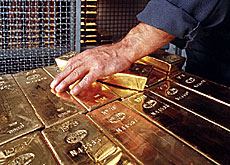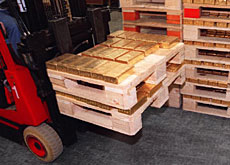Gold still shines for the Swiss

Swiss experts believe the price of gold could rise to even greater heights - despite rocketing almost 40 per cent over the past two years.
The metal, derided in the 1990s as a poor investment, is currently worth around $350 an ounce (SFr475) – its highest level since 1997.
Along with the Swiss franc, gold remains one of the world’s traditional “save havens”. In times of uncertainty, investors pile into the yellow metal, safe in the knowledge that it is the only real security against economic collapse.
After the tumult of the dot-com era, and ongoing instability in global equity markets, gold has taken on a new lustre, even though demand for jewellery remains stable.
“The price of gold is determined by the geopolitical situation, as well as demand,” says René Petter, head of Bank Leu’s precious-metals division.
Petter does not believe the Iraq crisis will be defused in the short term, and says demand for gold remains high – particularly among Japanese and Chinese investors.
Swiss still selling
The irony of a strong gold price is that some central banks, including the Swiss National Bank, have been selling off much of their reserves of the yellow metal.
Since May 2000, the Swiss bank has been selling an average of one ton per day.
The Swiss gold sale follows a global trend, whereby central banks are no longer using gold to balance their national currency – a traditional mechanism for ensuring stability.
By 2004, the central bank plans to have sold-off some 1,300 tons of Swiss gold vauled at around SFr20 billion.
The staggered sale forms part of a deal struck with other European central banks which was aimed at preventing a slump in the gold price.
Dollar down, gold up
Worries about a slump in the price look totally overdone today, with the metal having been on an upward curve since the economy took a downturn. At the same time, the US dollar has tumbled in value.
The dollar has been on a downward trajectory since October 2000. Some analysts believe further falls could drive up the gold price even further.
However, Petter says the relationship between the dollar and gold is prone to exaggeration.
“The dollar is extremely dependent on the situation in Iraq,” Petter told swissinfo.
“That and the difficult economic situation in the US, along with the massive current account deficit have ensured the US currency is no longer considered a safe haven.”
Should the situation in Iraq to remain unresolved; Petter predicts the dollar will fall as low as SFr1.28 before year’s end. On Friday, the US currency was trading at SFr1.35.
Has gold peaked?
At the beginning of February, gold $389 an ounce, but fell back slightly after dealers sold to lock in profits.
Nevertheless, Petter says gold fever is still running hot. “The price of gold could again climb over $380.”
Martin Jetzer, chief economist at HSBC Guyerzeller, agrees. “Two years ago the price of gold began an upward trend. This will probably continue until 2005,” Jetzer told swissinfo.
Jetzer also subscribes to the view that that a weak dollar has fuelled the gold boom. “We have seen this over the long-term,” he says.
Fabulous gold
Marc Faber, a Hong Kong-based Swiss finance expert who predicted the 1987 stock market crash as well as the 1997/8 financial meltdowns in Asia, believes gold is still a winner.
In his latest market commentary, Faber urges investors to jettison the dollar and US securities in favour of gold.
swissinfo, Elvira Wiegers (translation: Jacob Greber)
Experts attribute the rise in the gold price to political uncertainty brought on by a possible war in Iraq.
Japanese and Chinese investors are among the biggest buyers.
The price has risen despite massive sell-offs of reserves by central banks, including the Swiss National Bank, which has been selling one ton per day since May 2000.
Gold has risen as the value of the dollar has declined.

In compliance with the JTI standards
More: SWI swissinfo.ch certified by the Journalism Trust Initiative











You can find an overview of ongoing debates with our journalists here . Please join us!
If you want to start a conversation about a topic raised in this article or want to report factual errors, email us at english@swissinfo.ch.